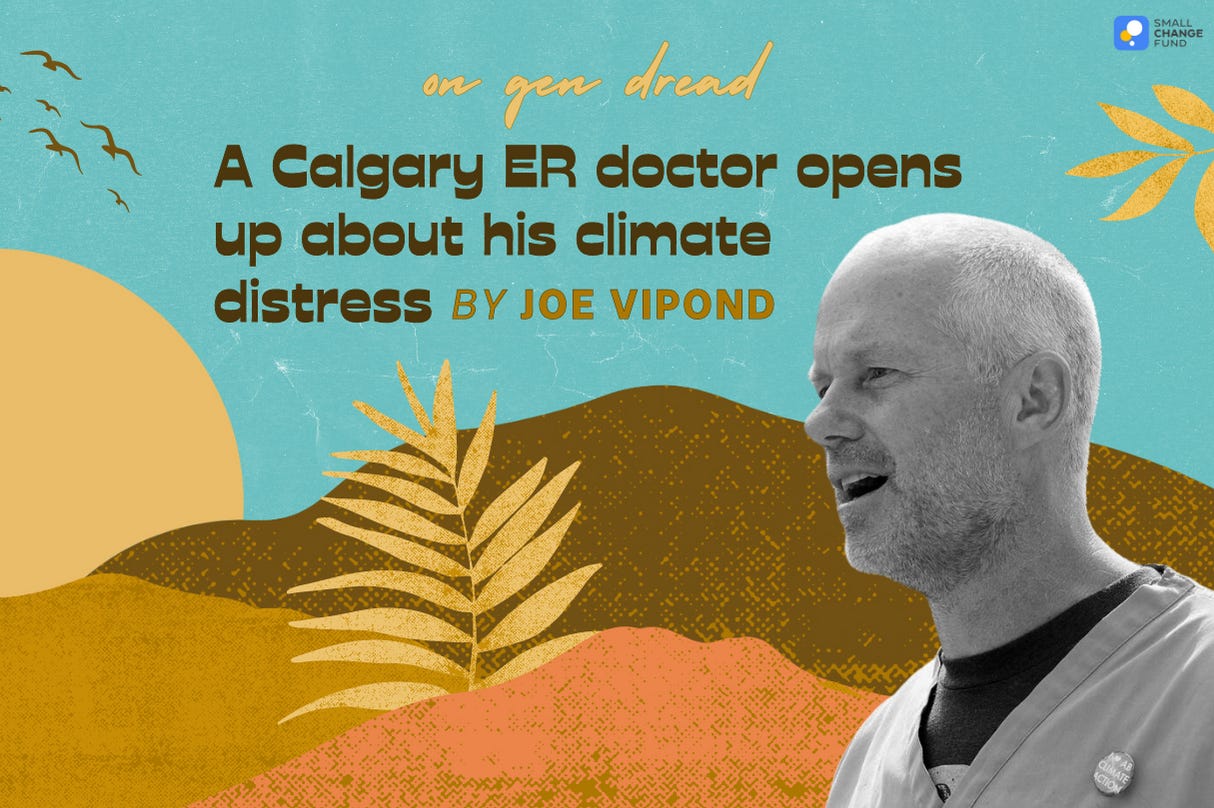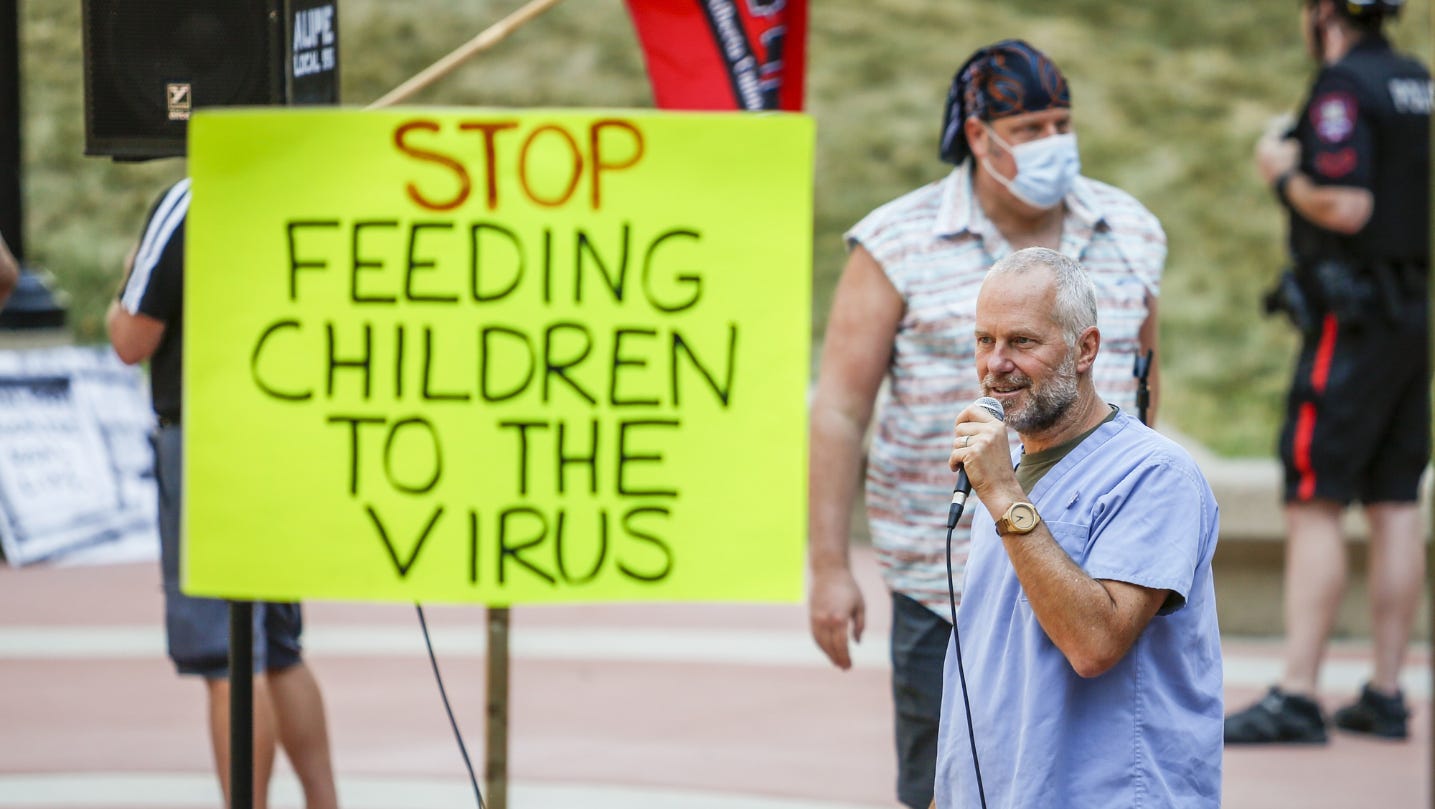Read an ER doctor’s essay on climate distress that no one else would publish
Dr. Joe Vipond walks through the tangle of conflicting feelings he’s attempting to hold
Hi there!
Welcome to Gen Dread, a newsletter about how the climate crisis is making us feel, why that’s happening, and what we can do about it. Subscribe now to find community, comfort, and practical coping and acting strategies from experts all around the world.
Dr. Joe Vipond has been a climate activist for many years, and he’s contributed several op-eds to various Canadian publications. But when he recently opened up about his climate distress and tried to publish the essay below, no media outlet would take it. Next week we’ll bring you a conversation with Dr. Vipond where he’ll explain why he suspects that is. But this week, please read his moving and essential piece.
“I confess, I gave in to despair”
It’s been a very challenging spring, if you have any knowledge of the impending (present) climate crisis.
News stories of unusually early and abnormally intense wildfires across the north of our country.
Scientists pointing out the incredible heat growing in the North Atlantic ocean water.
A recent Alberta election where neither party deigned to discuss the hard truths of climate science and its implications for our industry, agriculture, and health.
Our premier, unable to make the connection between the grossly abnormal weather and our wildfires, instead blaming arsonist ghosts.
And the undeniable sight, smell, and impacts of smoke pervading our streets and homes.
It’s all a bit much. And I confess, I gave in to despair. I recently tweeted out “I am so sad about the world and where it is going. I tried so hard. It was never enough. Please forgive me, children, animals, plants, ecosystems. This is all so tragic.”
The response was immediate. Some concerned: “Are you OK?” Some dismissive: “What a drama queen”. But mostly: “I feel exactly this.”
It’s hard to deny now the impacts that our fossil fuel extractive economy is having on the natural world around us. Hard to deny that the degradation of our natural world is having impacts on our society. And to think of how this will worsen with time in the near and far future.
The emotions we feel are not pathological. It is very normal to feel despair when presented with the reality that we face. It’s like 8 billion people, and most of the animals and plants have just been given a serious, maybe palliative, cancer diagnosis with the only possible cure being giving up on burning fossil fuels. And we’re just not ready to do that yet.
What if part of our inability to deal with the underpinnings of the climate crisis has to do with our refusal to acknowledge the emotions of what we are feeling? In our society, we must pretend that all is well, don’t look at that scary stuff over there, let’s go for brunch. Don’t look up.
Aside from despair, there is a gamut of emotions in my soul.
I feel grief: for the beautiful and alive ecosystems we are losing.
I feel guilt: the gas-guzzlers I’ve owned before I was more aware, the flights to here, there, and everywhere.
I feel anxiety: for the threat that befalls us over which we as individuals have very little control.
I feel terrified: for the very real prospect of my life, and/or my children’s lives, being curtailed by calamity.
I feel jealous: of those who can ignore what is happening, continuing to live their lives as if nothing is at risk.
I feel angry: because there are people and corporations and politicians behind the myriad of bad decisions that have led to this. And none has faced accountability. And many still are in positions of power.
I feel love: for this planet, for humanity, for life. It is often when the things you care about are threatened that you understand exactly why you value them so much.
I feel community: for the people who do care, who show what we can accomplish when we try to make the world a better place. And caring people are truly the bestest friends a guy could ask for.
Some people have suggested my tweet was a surrender. But let me be clear: I will never give up. My kids, the insects, the oceans, this province, deserve that I continue to advocate for a safer future until there is nothing left to fight for.
Things are going to get worse. This is just a preview to the future, which will continue to warm as long as we continue to produce methane, CO2 and other warming gasses into the atmosphere. Every fraction of a degree of warming avoided is worth the efforts we make today. Which is why there is such desperation in the scientists' voices.
“Is there any hope?” is the question I hear most asked at climate events. My answer. “Nobody knows what the future holds. But unless we do what the science says, there will for sure be bad outcomes. Please help.”
Getting involved creates active hope, for you and for me.
“UNLESS someone like you cares a whole awful lot, nothing is going to get better. It’s Not.” -The Lorax by Dr. Seuss.
Dr. Joe Vipond is an emergency doctor in Calgary, the past-President of the Canadian Association of Physicians for the Environment, and the co-founder of the Calgary Climate Hub.
If you liked reading this, feel free to click the ❤️ button on this post so more people can discover it on Substack 🙏🏼
As always, you can share your thoughts and reach the Gen Dread community by commenting on this article or replying to this email. You can also follow along on Twitter and Instagram.
‘Till next time!








This is my mantra:
I am one person
I did not cause this mess alone
I cannot fix this mess alone
I have to live in a society that doesn't support good choices, so I must make compromises
If my mental health fails, I will not be able to contribute or fight
I am not a bad person if I have limitations
I can't always do more so that others can do nothing
I am not perfect
I am not pure
I am not tireless
I am only human and doing what I can
... and then I get back to work
We need more brave folks to speak up and have voices heard. This is not going away we have to face the difficult conversations. I use photography to open up conversations in groups. It's a way to process how we're experiencing the climate crisis.